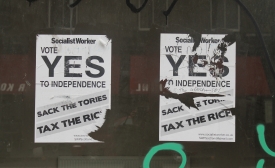isis
Over the past few days, the positions and activities of the GCC and Egypt, Iraq, Jordan and Lebanon are becoming clearer against ISIS. The group, which met in Jeddah on Sept. 11, can now be dubbed the GCC+4. First, the GCC+4 is to develop a multi-prong approach to soft power options to break ISIS’s logistical chains in manpower and finance as well as to develop counter-narratives to negate the group’s capabilities and messaging.
The fundamentalist militant group ISIS has capitalized on the power of social media to spread its message and recruit new followers, but social networks and governments are fighting back. On Thursday, VKontakte, the Russian equivalent of Facebook, announced it will ban accounts affiliated with the ISIS terrorist group.
According to The New York Times, a senior State Department official speaking before the meeting with Arab foreign ministers said Kerry planned to not only ask the Arab states to increase their public condemnations of ISIS, but also to “ask them to use their state-owned media, too.”
U.S. Secretary of State John Kerry arrived Saturday in Cairo on the latest leg of a regional tour to forge a coalition against Islamic State militants in Iraq and Syria. Kerry is scheduled to meet Egyptian President Abdel Fattah al-Sisi and Arab League chief Nabil al-Arabi.

CPD Advisory Board Member Kounalakis on what gets lost when independence is gained.
Moving to end the Islamic State’s reign of terror in the Middle East, several nations are weighing hard-power, military options as well as soft-power propaganda tactics to dismantle the extremist army, discredit its ideology and discourage foreign recruits from its influence.
On Wednesday evening, just before the 13th anniversary of the Sept. 11, 2001, attacks that have shaped modern American history, President Obama gave a speech that outlined a plan for fighting the Islamic State extremist group. Here's some of the reaction from a selection of countries.
Mr. Obama is acting as polls show rapidly shifting public opinion, with a large majority of Americans now favoring military action against ISIS in Iraq and Syria, even as they express deep misgivings about the president’s leadership, Mr. Obama is also facing difficult crosscurrents on Capitol Hill, where Republican lawmakers, initially reluctant to demand congressional authorization of military action, have begun agitating for a vote...







